4/8/14....
4/7/14 .....
Al-Thinni officially appointed PM, new government within a week
By Ashraf Abdul-Wahab and Hadi Fornaji.
Tripoli, 8 April 2014:
Abdullah Al-Thinni was today officially appointed as Prime Minister by the General National Congress (GNC) and asked to form a new government within a week.
“The GNC has appointed Thinni and given him authority full to form a new government,” GNC member Ahmed Langhi told the Libya Herald. Once approved by Congress, the government would work until Libya’s new parliament – the House of Representatives – was elected, he said.
“Thinni has already started work on forming a new government for the GNC to approve,” Prime Ministry spokesperson Ahmed Lameen said.
The move was widely expected. Following the decision to sack Ali Zeidan, there had been deadlock in the GNC over the two front runners being considered by Congress to replace him, Omar Al-Hassi and Mohamed Abu-Baker. Al-Hassi was seen as the choice of the Islamist bloc while Abu-Baker was favoured by a significant number of non-Islamists. By last week, it was clear that a growing number of Congress members had cone to the conclusion that Thinni, as compromise candidate, was also the logical one as well.
Although believed to be reluctant to do the job, Thinni yesterday submitted a letter to the GNC demanding that he and his government be given more power and authority. The letter said that, unless these powers were given and the GNC stopped interfering in the government’s affairs, Thinni and his ministers would resign.
GNC spokesperson Omar Hemaidan said that Congress had taken into account Thini’s request for more power to run the government effectively.
Kufra Tebus call for municipal elections to be postponed
By Jamal Adel.
Tripoli, 8 April 2014:
Tebu elders in Kufra have called on the Ministry of Local Government to delay the town’s municipal elections and meanwhile assess the needs of its Tebu districts .
The head of the Tebu committee of elders in Kufra, Husain Aya, told the Libya Herald that the body charged in November with evaluating the needs of Tebu majority districts in Kufra had not yet arrived. He insisted that, because of this, the elections scheduled for 6 May could not go ahead.
“The committee of judges and the head of the crisis committee in Kufra, Ali Al-Bahbah, were meant to have completed fact finding procedures on the ground and an evaluation,” he said. “This has not yet been accomplished.”
The evaluation committee was formed last year as one of the conditions for Tebu demonstrators from Kufra and its surrounding area ending their blockade of Sarir power station. Protestors were demanding a sub-council be established for the Tebu districts in Kufra where, at present, all local council members are Arab. They also demanded that the nearby Tebu town of Rebyana be given a municipal council of its own. The committee was supposed to consider how authorities might address these demands.
“We can’t go back to square one,” Aya said. “We have sent letters to the Ministry of Local Government, urging them not to hold elections until the evaluation committee had performed its duties,” he added.
The Chairman of Central Committee for Municipal Council Elections, Otman Gajiji, declined to comment directly on the matter but said that at present Rebyana was a voting centre for Kufra and not a municipal area in its own right.
There have been suggestions that, rather than become municipality on its own, Rebyana could because a special district directly under the Local Government Ministry.
Kufra has been the site of frequent clashes between ethnic minority Tebu and Arab majority Zwai tribesmen since the revolution in which hundreds have died and many more have been injured.
and.....
Former local education head shot dead in Benghazi
By Noora Ibrahim. Benghazi, 8 April 2014: A former head of education for one of the districts of Benghazi has been shot dead in the city. Mohammed El-Lasi,…
Derna Islamist leader murdered
By Special Correspondent. Derna, 8 April 2014: One of the leaders of the newly formed Derna Islamist militia, the Shoura Council of Islamic Youth in Derna, has been…
GNC group calls on Abu Sahmain to resign
By Libya Herald Staff.
Tripoli, 7 April 2014:
A group of 30 members of the General National Congress (GNC) has demanded the resignation of Congress head Nuri Abu Sahmain, over leaked video footage relating to an incident earlier this year.
The video shows Abu Sahmain being interrogated by an unknown person and admitting that two women visited his home one evening in January. Both he and the GNC denied the incident and Abu Sahmain’s alleged arrest at the time.
In the televised statement aired yesterday, the 30-strong group said that Abu Sahmain had lost the confidence of the Libyan people after lying about the events of that night. They insisted that, if he did not resign, Congress would consider relieving him of his duties.
The group also claimed that Abu Sahmain had overstepped his jurisdiction when he threatened federalists occupying eastern oil ports with a military offensive.
A source at the GNC, speaking on condition of anonymity, told the Libya Herald that, because of the incident, some members felt that decisions made by Abu Sahmain no longer carried any authority.
Some Congress members felt so strongly about this they had boycotted recent sittings headed by Abu Sahmain, he added.
The Attorney General ordered an investigation into the incident, and the release of the video footage, the day after this was circulated on the internet.
This announcement, however, was then somewhat overshadowed by the Attoney General’s controversial decision to release three Libyans who allegedly forced rogue oil tanker the Morning Glory to sail into international waters loaded with a shipment of illicitly-obtained oil at gunpoint.
Oil port deal on, despite government silence
By Muttaz Ali and Tom Westcott.
Tripoli, 7 April 2014:
The oil port deal struck between members of the government, the General National Congress (GNC) and the self-declared ‘Cyrenaica government” does appear to be genuine, despite a deafening silence from the government on the subject.
There was confusion today, after last night’s reports about the handing over of two blockaded eastern oil export terminals, Zueitina and Hariga (Tobruk). Justice Minister Salah Al-Marghani was expected to give details of the deal in a joint press conference with self-styled federalist leader Ibrahim Jadhran and members of the “Cyrenaica Government”.
However, Marghani was not present at this press conference and only Jadhran and the head of the “Cyrenaica government” Abdraba Abdulhamid Al-Barasi, spoke.
“After we signed the agreement, it was planed that we would make a joint press conference in Zueitina but, because of problems at Benina airport, this did not happen,” spokesman for the ‘Cyrenaica government’, Ali Al-Hasi, told the Libya Herald.
“The Cyrenaica government has informed the National Oil Company (NOC) it can immediately start using the oil ports,” he said, adding that the ports had been kept in good condition and were ready to get back up and running.
Today, no official comment or announcement materialised from the government, which had previously denied being involved in negotiations with the federalists blocking the ports. The Ministry of Justice did, however, publish a copy of the agreement to open the two ports on its official website today, although with no additional comment.
This statement was signed by Jadhran, Barasi and a member of the GNC, Sherief El-Waffi.
“The GNC is not formally involved in this issue at all, but we have some members making efforts to solve this problem,” Congressman Ahmed Langhi said today. “They were representing themselves and the interests of people in the districts they represent.”
He added that the GNC would be discussing the deal and the ongoing situation with two terminals which remain closed, Ras Lanuf and Sidra, in tomorrow’s sitting. Langhi said he was unable to give further details.
Meanwhile, the situation at the actual ports concerned remains much the same.
“I also heard the media reports that the ports would be reopening but I have received no formal letter or instruction,” Hariga Port Manager Rasab Abdul Razoul said. He added, however, that he was optimistic that over the course of the next few days operations at the port would be restarted.
Central Bank “has enough money for three years” without oil
By Michel Cousins.
Tripoli, 6 April 2014:
The Central Bank of Libya (CBL) has enough reserves to fund Libya for another three years without earning anything from oil sales, the bank’s head of reserves has said.
“We have enough funds for three years without getting a single US cent from oil,” Musbah Alkari has told the Libya Herald. The bank had “more than $115 billion (LD 142 billion) in foreign currency reserves” placed outside the country, he said – in banks such as HSBC, Bank of New York, Barclays and through clearers such as Clearstream. Around 60 percent of it was in dollars, the rest mostly in euros and sterling.
Add to this the reserves of around $50 billion (LD 62 billion) of the Libyan Investment Authority (LIA), Alkari said, and there was enough for around four and a half year’s spending without any oil being sold.
Reports of Libya running short of cash and being unable to fund projects were absolute nonsense, he said.
Moreover, “we don’t have any debt” unlike the US or UK, said Akari, who is also the chairman of the Goumhouriya Bank. “We can borrow” if needed. Banks would be delighted to lend, he said. But Libya does not need to borrow, he stressed.
The CBL invests in the money market and in bonds, notably US, Europe and UK government bonds and those of other financially reliable countries, he said. “We won’t touch anything in Greece or Portugal or even Ireland, for example. We have to look at ratings. Greece has junk rating.” However, it does invest in Spain and Italy – “it’s a neighour”, he said referring to the latter, and its economy was sounder than rumoured.
Fifty-four percent of reserves is invested in bonds and treasuries. “The rest, 46 percent, in the money market or is held in shares in the Italy’s UniCredit Group, ABC Bahrain and the Libyan Foreign Bank”.
Sitting in his small office with the latest reserve statements in front of him, he can look through a glass window into the treasury room where some 35 people operating round the clock in front, middle and back office operations, are hard at work. Smartly-dressed and with ties, mostly in their late 20s or early 30s, and all Libyans, none would appear out of place in treasury operations anywhere in the world.
Bonds are held for maturity or traded . “It depends on liquidity needs”, Alkari explained.
However on the money market, CBL looks at short-term investments. “The duration for any investment is less than one year”. Overnight to six-month investments account for 29 percent of the whole reserves operations.
Last year there was a return of $1.3 billion (LD 1.6 billion) on operations, around 1.25 percent, Alkari said. Hardly a great deal, but the aim was not to make a profit but rather capital preservation. “We’re not a commercial bank,” he stressed.
The 2014 budget requested by the government, but still not approved by Congress, is LD 68.6 billion. Of that, two-thirds are for salaries and subsidies. Development and reconstruction account for less than 20 percent.
Given that the private sector would play an ever-greater role in Libya’s development, the role of the commercial banks was seen as a crucial element in funding Libya’s future, Alkari pointed out.
Fully half of commercial banks’ assets are invested in economically unproductive government paper.
“We have to speak about the commercial banks,” he said. “They have LD 80 billion ($65 billion) in assets, LD 41 billion of which is held in Certificates of Deposit with the Central Bank. Just half of that, LD 20 billion, is enough for many current projects.”
The private sector, he said, has a further LD 15 billion ($12 billion) held in cash at home and in the suq – around LD 2,500 per person – to fund growth. The private sector was exploding, he said, and those funds would be used.
“Our message is simple. Libya is not going bankrupt,” Alkari declared, and in any event, despite the problems, oil and gas are being produced and sold. Moreover, the current difficulties would be resolved long before they started to seriously impinge on the country’s financial reserves.
Libya’s problem was not money, he said; it was transparency. That was the real challenge.
Benghazi airport reopens
Tripoli, 7 April 2014:
Benghazi’s Benina airport has reopened after being closed yesterday by protesters as part of the city’s general strike over the deteriorating security situation in the city.
The airport’s manager said that an agreement had been reached with the protesters and that all international flights had been resumed, according to Libyan news agency LANA.
Hundreds of passengers were left stranded both in Libya and abroad after protesters shut down air traffic control and dragged large items onto the runway to prevent planes from landing.
One aircraft from Turkey was unable to land and had to return to Istanbul with all its passengers. These apparently included a number of surgeons who were going to Benghazi hospitals to perform operations.
Two eastern oil ports to be reopened
Tripoli, 6 April 2014:
Two of the blockaded eastern oil ports are to be reopened after an agreement was reached this evening between the government and federalists operating under the control of Ibrahim Jadhran.
The oil export terminals at Zuetina and Hariga are to be reopened, according to Libyan news agency LANA. It is not clear what the situation is with regard to Sidra, where a shipment of oil was illicitly loaded onto the tanker Morning Glory in early March.
A full statement on the situation is expected to be made by Justice Minister Salah Al-Marghani on state television later this evening.
The terminals have been blockaded since the end of July last year.
Benghazi shuts down in mass protest
By Ayman Amzein.
Benghazi, 6 April 2014:
The first day of a general strike in Benghazi over the deteriorating security situation in the city has left the airport closed, shops shut and streets deserted.
Today is the first day of a planned general strike, which has been planned for over a week. The strike is in protest against the lack of action taken by the government and the General National Congress (GNC) to improve the dire security situation in Benghazi. Military and security personnel in the city have been systematically targeted for over a year and several hundred have been assassinated in individual attacks.
“It is a total shutdown. Everything is closed,” one local resident told the Libya Herald. “The banks, schools and shops are all closed and there are hardly any cars on the road.” He added that Sunday lunchtime was normally one of the worst times for traffic in Benghazi.
Benghazi’s Benina Airport is also closed with no flights able to operate in or out of the airport. The Airport Road was, this morning, blocked with tyres to prevent people driving up to the airport. Several other roads in the city were blocked, including Jamal Street.
The city’s schools and the university are closed and say they will remain so until Thursday.
Bishr condemns attack on PM’s office
By Ashraf Abdul-Wahab.
Tripoli, 6 April 2014:
Hashem Bishr has condemned the incident on Friday when members of the Tripoli Revolutionaries Brigade laid siege to the Prime Minister’s office. Four vehicles belonging to the army’s 127 Brigade were reported stolen during the two-hour siege.
The brigade is led by his former SSC colleague Haitham Tajouri, although he is believed not to have been present at the incident.
Speaking to the Libya Herald about the incident, Bishr said he condemned “any attack on government property”. He added that he had not been in contact with Tajouri recently.
The incident followed the attack early on Friday morning on the Tripoli Revolutionaries Brigade’s headquarters at an ostrich farm at Bir Ustamilad in south Tajoura. Forces from the Libyan Revolutionaries Operations Room supported by Tajoura Military Council moved in at about 6am and after clashes ejected the Tripoli Brigade from the farm and now control it.
Tajouri and Bishr have been seen as politically close. Bishr once described Tajouri as “Tripoli’s first revolutionary”.
The attack is itself seen as linked to the release of videos last week in which Nuri Abu Sahmain, the president of the General National Congress and creator of the LROR, is interviewed by a man widely believed to be Haitham Tajouri about his being taken in for questioning over the presence of two women in his house in January.
The videos and their release have damaged Abu Sahmain’s position and credibility, which is thought to have been the intention. Many Congressmen now say that Abu Sahmain cannot continue in office.
He, however, has made it clear that he has no intention of resigning, and is supported by the LROR and sympathisers in Congress who fear his departure would weaken their influence.
Local council says no strike in Tripoli, but schools still affected
By Libya Herald staff.
Tripoli, 6 April 2014:
Tripoli Local Council has denied allegations that Benghazi’s general strike has spilled over into the capital.
“A false statement was spread on social media networks suggesting that Tripoli Local Council is also declaring a state of civil disobedience,” a spokesperson for the local council, Asma Al-Fatsi, told the Libya Herald.
“These statements were actually made in November during the Ghargour incidents in Tripoli, and people just changed the dates,” she said.
A planned ten-day general strike in Benghazi, which is being described as an act of ‘civil disobedience,’ started today. It is in protest against ongoing assassinations and the deteriorating security situation in the city.
“We are in absolute solidarity with Benghazi,” Fatsi said. “Although it isn’t entirely clear why a state of civil disobedience should be held.”
The general strike has, however, had a knock-on effect on schools in Tripoli. Despite assurances from the Ministry of Education that schools across Libya would be unaffected, at least one school in Tripoli was closed today.
The school, in the Mansoura district of the capital, opened as normal this morning but then armed men reportedly forced it to close. They said it should stay shut until the government and the General National Congress collapsed.
Other Tripoli schools, particularly primary schools, were reportedly poorly-attended today.
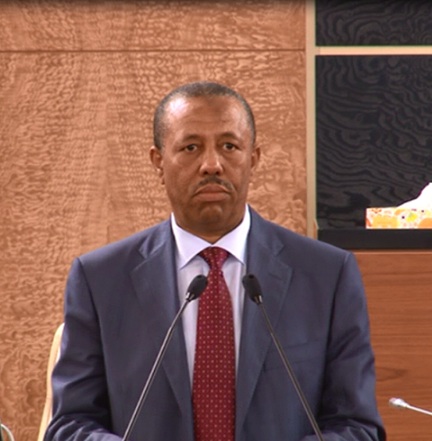
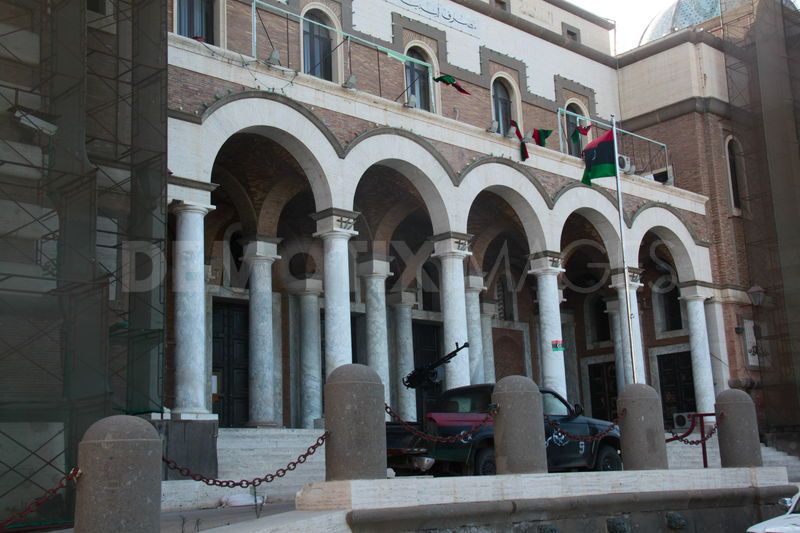
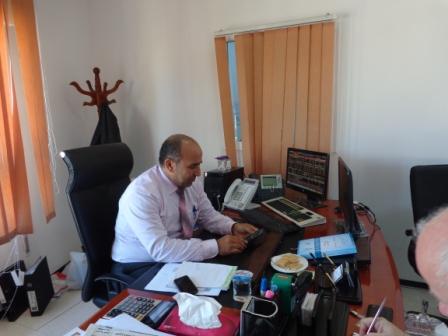
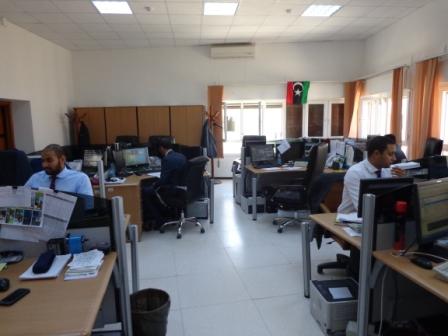
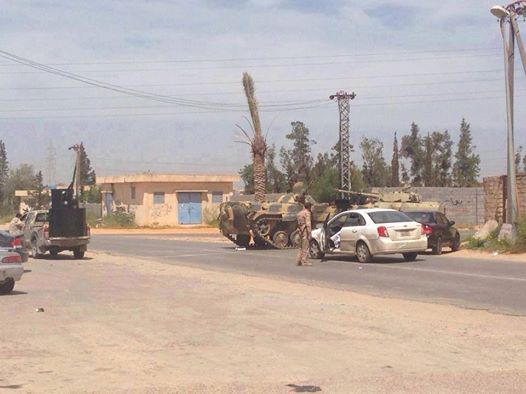
No comments:
Post a Comment